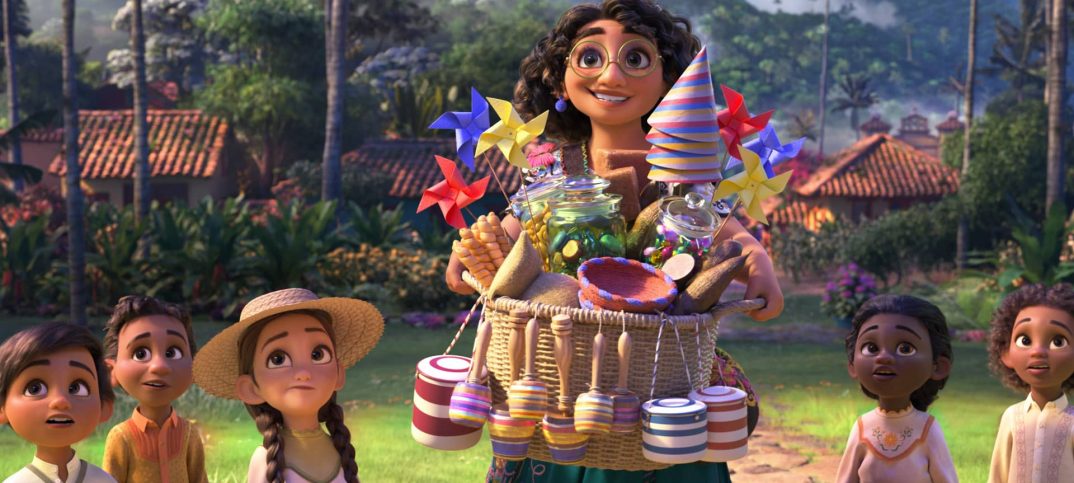Reviewed by Jeffrey Sanzel
The question of “What is a gift?” is the driving force of Disney’s 60th feature film, Encanto. Set in the mountains of Columbia, in an unspecified “once upon a time,” Encanto is one of Disney’s finest and most sophisticated animated musicals. Exquisitely directed by Byron Howard and Jared Bush (with a screenplay by Bush and Charise Castro Smith), this is a memorable story of family and responsibility.
Fleeing from marauding conquerors, Alma Madrigal loses her husband, Pedro, but saves her infant triplets. An “Encanto” is a charm; here, the spell is in a candle. The magical force of the candle creates the “casita”—a magic home for Alma and her children.

The Encanto blesses each member of the Madrigal family with a special power. Together, these “gifts” help maintain the community. But what happens when that gift brings visions no one wants to know? Or, even more challenging, when a child seemingly has no gift at all? The latter is the case with granddaughter Mirabel, the heart of the narrative and, ultimately, the center and savior of family and village.
Mirabel is a quirky, frustrated young woman; smart and articulate but under-appreciated. Her mother, aunt, sister, and cousins outshine her with their showy skills. Julieta, Mirabel’s mother, heals any ailment with food. Gorgeous Isabela, Mirabel’s oldest sister, is considered perfect and makes flowers bloom. Just behind Isabela is Louisa, a girl of Herculean strength. Aunt Carolina’s emotions control the weather; she is often followed by her own cloud hovering over her head. Cousin Adassa has unparalleled hearing. Cousin Rhenzy is a shapeshifter, taking on the appearance of anyone he meets. Cousin Ravi-Cabot communicates with animals.
While seemingly wonderful, these powers carry burdens as well, shared in often hilarious and telling ways.
The action goes into gear on the day Cousin Ravi-Cabot is to receive his gift. Mirabel, his favorite cousin, gives him the strength to face whatever is to come his way. While everyone is celebrating, Mirabel sees the house beginning to crack and the candle in danger of being snuffed. Her alarm is revealed to be a vision, but most do not—or choose not—to believe her. She embarks on a quest to solve the danger, encountering her Uncle Bruno, who had disappeared after his prognostications were met with resistance.
With the knowledge gathered from Bruno, Mirabel understands her course and the dangers it includes.
Encanto is emotionally complicated and avoids preciousness. There is humor and plenty of magic, but the lessons it imparts are genuine.

Encanto is perhaps the least saccharine of any Disney film. Visually, the film is extraordinary, exploding with color and action. The house itself is a dynamic character, with its communicating tiles, floorboards that deliver slippers, and an alarm clock that nudges the householders to move along.
The characters are charmingly animated, simultaneously broad and subtle. But, in the end, the film’s imparting is the all-important message that gifts do not have to be flashy and that miracles come from belief, perseverance, and love. The film never loses sight of these morals.
The vocal talent is exceptional. Stephanie Beatriz’s Mirabel is tremendous, portraying a struggling soul, imbuing her with perfect comedic timing and profound humanity. John Leguizamo’s Uncle Bruno uses twitchy antics to very slightly mask the character’s underlying sadness. Diane Guerrero’s seemingly vain Isabela finds new shades in her transformation.
In Luisa, Jessica Darrow shows the drain of never complaining. And Maria Cecilia Botero raises the grandmother above caricature, finding depth and pain in the matriarch who comes to terms with her misplaced iron will. (Many of the actors will be voicing the Spanish language version as well.)
Hamilton/In the Heights’ Lin-Manuel Miranda has fashioned a serviceable and pleasant score, but the film stands on its own. An attempt to introduce the roster in “The Family Madrigal” doesn’t quite succeed but establishes the world in which the tale occurs. The strongest numbers are “Dos Orguitas,” a haunting tune sung in Spanish, and the joyous finale “All of You.”
Preceding Encanto is Far From the Tree, a wordless short about a raccoon parent protecting its child with tough love. While simple and traditionally animated, the two pieces share how families relate and the deep-rooted desire to protect. They are perfect compliments, sharing overlapping cores, with Far From the Tree delicate and Encanto spark and sparkle.
In the end, Encanto teaches not just acceptance within a family but how family and community come together. These are big concepts, and younger viewers might not get them the first time. But like the best of family features—The Toy Story series, Coco, etc.—Encanto will be one that children will return to as they grow.
And that said, there is much for everyone to relish in this beautiful and beautifully told tale
Rated PG, Encanto is now playing in local theaters.







